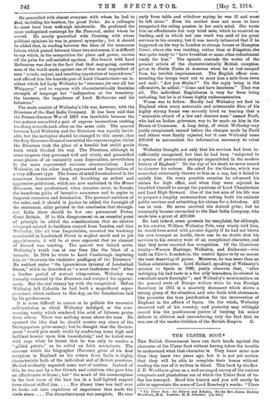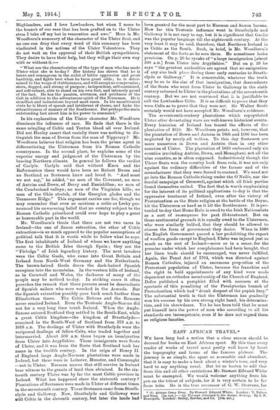THE ULSTER SCOT.*
THE British Government have run their heads against the character of the Ulster Scot without having taken the trouble to understand what that character is They know more now than they knew two years ago, but it is not yet certain that they will be able to complete their lesson without reading the rest of it written in blood. This book by the Rev T. B. Woodburn gives us a well-arranged survey of the various conquests and plantations out of which the Ulster Scot of to- day has emerged. Read this history and you will surely be able to appreciate the sense of Lord Rosebery'a words : " I love • The Ulster Scot Ms History and Religion. By the Bea. Jamea Barkley Woodburn, M.A. London H. B. Alleneon. [es. sea)
Highlanders, and I love Lowlanders, but when I come to the branch of our race that has been grafted on to the Ulster stem I take off my hat in 'veneration and awe." Here is Mr. Woodburn's summary of the diameter of the Ulster Scot, and no one can deny that every 'word of this summary has been vindicated in the actions of the Ulster Volunteers. They do not wait on the approval of their British sympathisers. They desire to have their help, bat they will go their ownway with or without it :—
" What are the characteristics of the type of man who has made Ulster what she is to-day ? Her history has shown that he is brave and courageous in the midst of bitter oppression and great hardship, and fights best when he faces groat odds ; he is deter- mined to the verge of stubbornness, and will accept no compromise ; stern, dogged, and strong of purpose ; independent, self-contained, and self-reliant, able to stand on his own feet, and intensely proud of the fact. He has the passion, alertness, and quickness of the Celt in addition to the adventurous spirit of the Norseman. He is steadfast and industrious beyond most races. In his uncultivated state ho is blunt of speech and intolerant of shams, and lacks the attractiveness of manner of the Southerner. But perhaps the main outstanding fact about him is his power to command."
In his explanation of the Ulster character Mr. Woodburn dismisses the influence of race. He finds that there is the same mingling of Celtic and Teuton blood all over Ireland. Did not Huxley assert that racially there was nothing to dis- tinguish the man of Devon from the man of Tipperary ? Mr. Woodburn believes that religion has been the prime agent in differentiating the Ulsterman from his Roman Catholic countrymen. In the second place, he explains some of the superior energy and judgment of the Ulsterman by the bracing Northern climate. In general he follows the verdict of Carlyle. Carlyle said that without Knox and the Reformation there would have been no Robert Burns and no Scotland as Scotsmen knew and loved it. "And must we not say," he added, "no men of the Covenant, no men of Antrim and Down, of Derry and Enniskillen; no men of the Cumberland valleys ; no men of the Virginian bills ; no men of the Ohio stretch, of the Georgian glades and the Tennessee Ridge." This argument carries one far, though we may remember that even so cautious a critic as Leaky pro- nounced his unwavering belief that no country subject to the Roman Catholic priesthood could ever hope to play a great or honourable part in the world.
Mr. Woodburn's thesis that there are not two races iu Ireland—the one of Saxon extraction, the other of Celtic extraction—is so much opposed to the popular assumptions of political talk that it is worth while to follow what he says. The first inhabitants of Ireland of whom we know anything came to the British Isles through Spain ; they are the "Firbolgs" of Irish legendary history. The next invaders were the Celtic Gaels, who came into Great Britain and Ireland from North-West Germany and the Netherlands. The brown-haired Gaels drove the dark-haired Spanish occupiers into the mountains. In the western hills of Ireland, as in Cornwall and Wales, the darkness of many of the people may be noticed to-day. In striking cases it often provokes the remark that those persons must be descendants of Spanish sailors who were wrecked in the Armada. But the Spanish extraction possibly goes back much further than Elizabethan times. The Celtic Britons and the Romans never reached Ireland. Even the Teutonic Anglo-Saxons did not for a very long time touch Ireland. When the Anglo- Saxons entered Scotland they settled in the South-East, while a great Celtic kingdom—the kingdom of Strathclyde— remained in the South-West of Scotland from 573 A.D. to 1018 A.D. The dealings of Ulster with Strathclyde were the reciprocal dealings of fellow-Celts, who traded together and intermarried. About 500 A.D. there began an immigration from Ulster into Argyllshire. These immigrants were Scots of Ulster, and it was from the Scots that Scotland took her name in the twelfth century. In the reign of Henry II. of England large Anglo-Norman plantations were made in Ireland, but these were in Leinster, Munster, and Connaught —not in Ulster. Norman names that still survive in Ireland bear witness to the grants of land then obtained. In the six- teenth century Ulster was by far the most Celtic province in Ireland. What has happened since the sixteenth century P Plantations of Scotsmen were made in Ulster at different times in the seventeenth century. These Scotsmen came from Strath. clyde and Galloway. Now, Strathclyde and Galloway were Still Celtic in the eleventh century, but later the lands had been granted for the most part to Norman and Saxon barons. How far this Teutonic influence went in Strathclyde and Galloway it is not easy to say, but it is significant that Gaelic was the popular language till the eighteenth century. At the very least it may be said, therefore, that Northern Ireland is as Celtic as the South. Such, in brief, is Mr. Woodburn's statement of the facts as he sees them. He sometimes lucks precision. On p. 20 be speaks of "alarge immigration [about 500 am.] from Ulster into Argyllshire." But on p. 26 ha says " the greatest authorities are agreed that no emigration of any size took place during those early centuries to Strath- clyde or Galloway." It is conceivable, whatever the truth may be as to the size of that immigration, that descendants of the Scots who went from Ulster to Galloway in the sixth century returned to Ulster in the plantations of the seventeenth century. But we are not convinced that it is justifiable to call the Lowlanders Celts. It is as difficult to prove that they were Celts as to prove that they were not. Sir Walter Scott certainly would not have accepted Mr. Woodburn's evidence.
The seventeenth-century plantations which repopulated Ulster after devastating wars are well-known historical events. Every historian of Ireland has traced the effects of the plantation of 1610. Mr. Woodburn points out, however, that the plantation of Down and Antrim in 1605 and 1606 has been neglected by nearly all writers. To this day Scotsmen are more numerous in Down and Antrim than in any other counties of Ulster. The plantation of 1610 embraced only six counties (excluding Antrim, Down, and Monaghan), not all the nine counties, as is often supposed. Industriously though the Ulster Scots won the country back from rain, it was not only against the ordinary difficulties of the farmer and of the manufacturer that they were forced to contend. We need not go into the Roman Catholic rising under the O'Neills, nor the fearful campaign of Cromwell, against which all Irish parties found themselves united. The fact thatis worth emphasizing for the interest of its political applications to-day is that the oppressive treatment of Ireland, even after the victory of Protestantism as the State religion at the battle of the Boyne, hit the Ulstermen as hard as it hit the Southerners. It is pre.. tended to-day that Home Rule is owed to the Irish Nationalists as a sort of recompense for past ill-treatment. But on those sentimental grounds itis equally owed to the Ulstermen, who were similarly bullied, that they should be allowed to choose the form of government they desire. When in 1695 the English Government passed a law prohibiting the export of woollen goods except to England, Ulster was injured just as much as the rest of Ireland—more so in a sense, for the promise under which her complaisance had been bought, that her linen trade should be encouraged, was never fulfilled. Again, the Penal Act of 1704, which was directed against Roman Catholics, injured an enormous proportion of the Protestant population of Ulster, because the franchise and the right to bold appointments of any kind were made dependent on orthodox membership of the Church of England. Defoe published a pamphlet filled with sarcasm at the spectacle of this penalizing of the Presbyterian branch of Protestantism which had " drunk deepest of the popish fury." The substantial truth is that the Ulsterman has gradually won his success by his own strong right band, his determina- tion, and his shrewdness. Yet he has been told that he must put himself into the power of men who according to all his standards are incompetents, even if he does not regard them as religious fanatics.















































 Previous page
Previous page